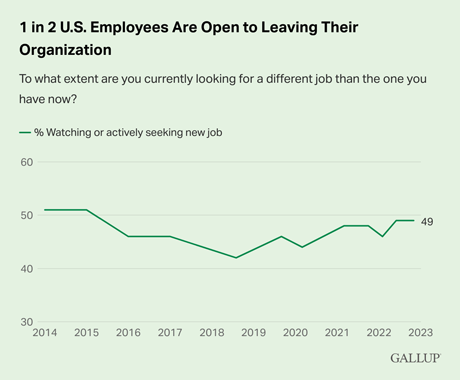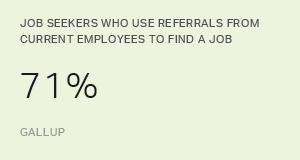A trillion dollars.
That's what U.S. businesses are losing every year due to voluntary turnover. And the most astounding part is that most of this damage is self-inflicted.
Here's how it breaks down for an individual organization:
- The annual overall turnover rate in the U.S. in 2017 was 26.3%, based on the Bureau of Labor Statistics.
- The cost of replacing an individual employee can range from one-half to two times the employee's annual salary -- and that's a conservative estimate.
- So, a 100-person organization that provides an average salary of $50,000 could have turnover and replacement costs of approximately $660,000 to $2.6 million per year.
The cost of replacing an individual employee can range from one-half to two times the employee's annual salary.
Add a highly competitive and tight labor market to the mix, and most organizations probably can't survive the loss of good people.
It's About More Than Money
Voluntary turnover costs money. But, as any leader or manager knows, turnover has many costs that never register directly on a spreadsheet.
Losing your best people means losing your reliable winners, your constant innovators and your most effective problem solvers.
Internally, it breaks down team morale. Externally, it can mean lost customer relationships. Depending on the quality of the exit, it can threaten your brand or, at worst, lead to litigation.
Losing your best people means losing your reliable winners, your constant innovators and your most effective problem solvers.
When it comes to rare talent, "voluntary turnover" is simply a nice way of saying, "You just lost the future."
Most Regrettable Turnover Is Eminently Fixable
You might think this is all part of the natural churn of talent. But, according to Gallup research, it's not.
Fifty-two percent of voluntarily exiting employees say their manager or organization could have done something to prevent them from leaving their job.
You may assume their manager did everything they could to make things right, but statistically, that's probably not the case. Over half of exiting employees (51%) say that in the three months before they left, neither their manager nor any other leader spoke with them about their job satisfaction or future with the organization.
Think about that for a minute.
In three months, nobody asked them how they felt about their job. Nobody talked about their future. So it makes sense that they decided they didn't have one there.
Fifty-two percent of voluntarily exiting employees say their manager or organization could have done something to prevent them from leaving their job.
Here's how you plug a million-dollar leak in your company: Train your managers to have frequent, meaningful conversations with employees about what really matters to them. What's frustrating them? What are their dreams? Where do they want to go?
Then you'll at least have a shot at winning back your stars, and saving the future of your company.
Gallup can help you retain your best employees:
- Offer your managers a course on coaching, the key to talent retention.
- Download our perspective paper on the exit experience to learn everything that contributes to turnover.
- Partner with us to develop an employee experience strategy that attracts and keeps your stars.



